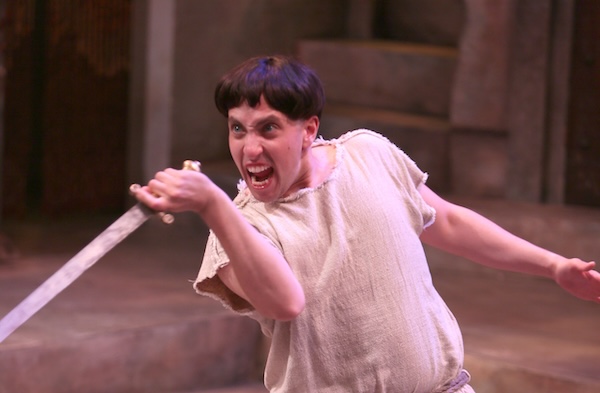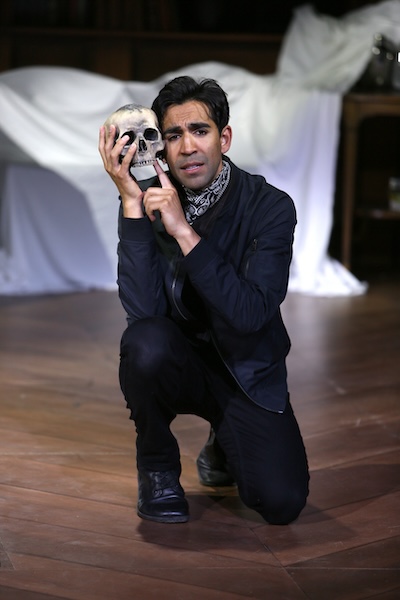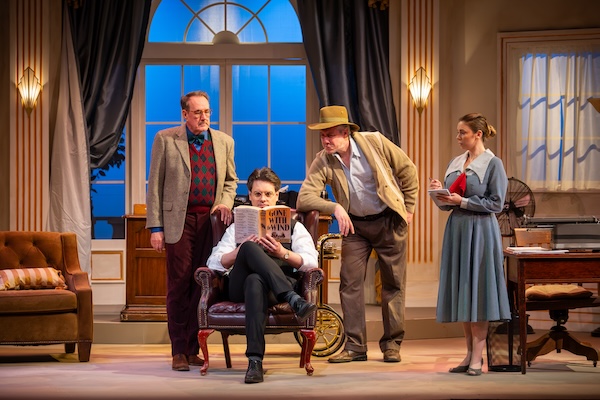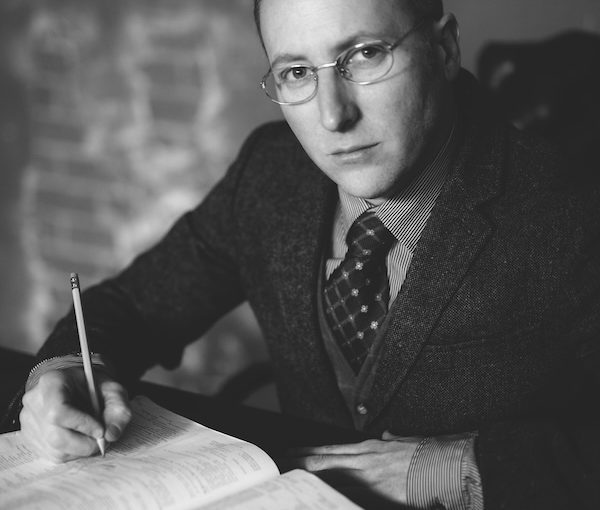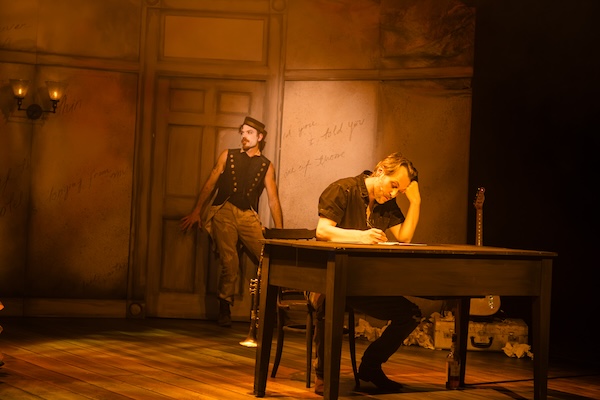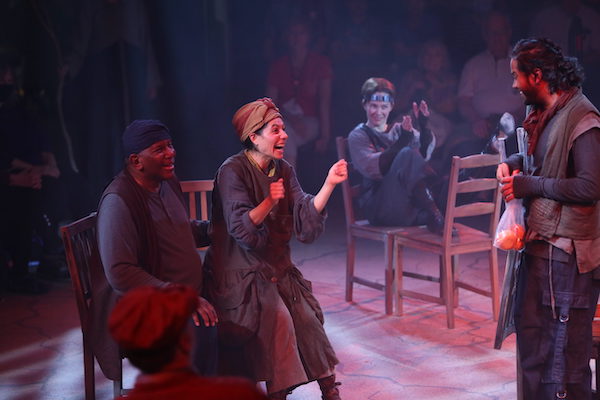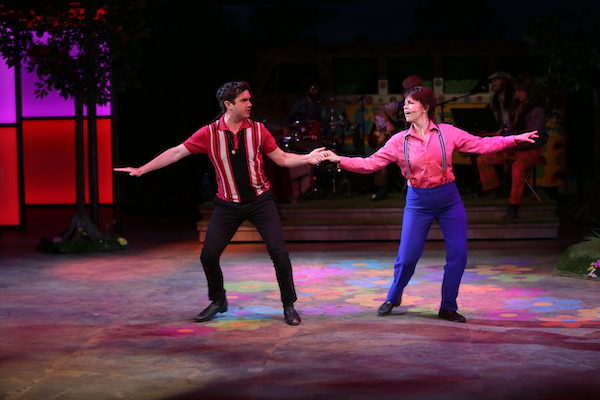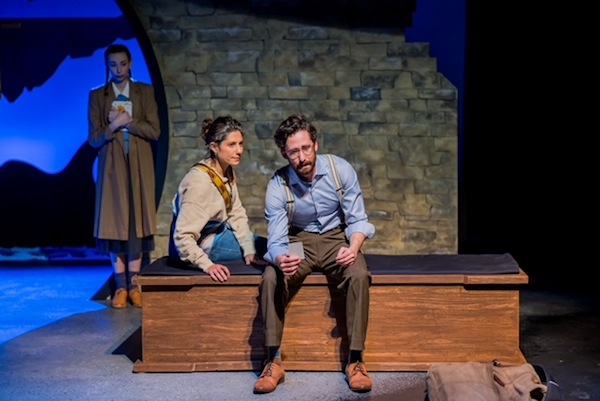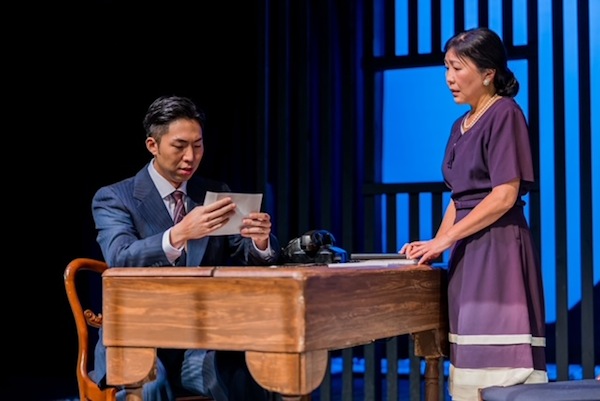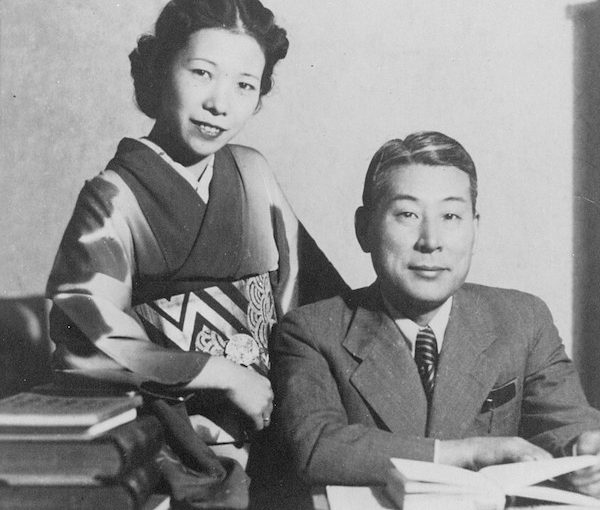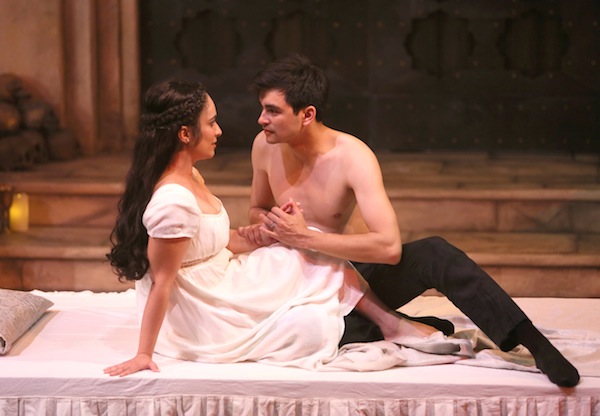Dromio in The Comedy of Errors. Bard on the Beach runs into September. (photo by Tim Matheson)
Every day, we are bombarded with news about war, hate, crime, inflation, the list goes on. How to make sense of it all? Often, good theatre can provide deeper meaning and understanding of the world, or at least offer us a break from the world. Cue Shakespeare and his 400-year-old lens that is remarkably accurate in contemporary times…. And that takes us to Bard on the Beach.
Last issue, I reviewed Bard’s productions of Twelfth Night and Hamlet (jewishindependent.ca/bard-plays-with-tradition). This issue, I start with Measure for Measure, then move to The Comedy of Errors.
In Shakespeare’s Measure for Measure, the Duke of Vienna has enacted laws outlawing sex between unmarried couples. He then leaves the city in the control of puritanical Angelo and disguises himself as a friar to observe what happens. A young man, Claudio, is prosecuted for the crime of impregnating his girlfriend and is sentenced to death. When the condemned man’s virginal sister, Isabella, a novitiate in a local nunnery, comes to plead for his life, Angelo is smitten. He offers to save Claudio’s life if Isabella will sleep with him. What a great platform to explore the male hierarchy, corruption, sexual predators, coercion and authoritarian control.
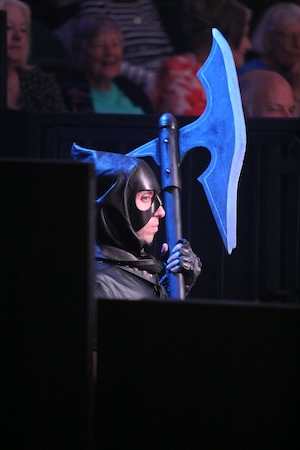
In the Bard production, director Jivesh Parasram has taken the story and, in an absurdist twist, made premarital dancing the offence punishable by death. The setting: the disco-crazed 1970s and ’80s, in the glitzy Club Europa. Act 1 opens with hooded monks frenetically dancing on a neon-lit dance floor replete with a disco ball, presided over by a silver-clad, fox-head-wearing DJ (Jewish community member Tal Shulman, who later does duty as the black-hooded executioner, Abhorson). The Duke (a superb Scott Bellis) rips off his monk robes to reveal a sparkly suit as he dances his way over to Angelo (a staid, suspendered Craig Erickson) and hands him authority over the city. The edict is given – tansen verboten (dancing forbidden) – but that does not stop an erotic pas de deux between Claudio (Jeremy Lewis) and Julietta (Tess Degenstein), leading to Claudio’s arrest and imprisonment.
When Isabella (Meaghan Chenosky) is told of her brother’s fate by Lucio (Karthik Kadam), she rushes to Angelo’s office. At first, she is rebuffed but then Angelo offers her Claudio’s life in return for a dance. She grapples with the request, wanting to save her brother’s life, but refuses, threatening to expose Angelo’s hypocrisy. His response: no one will believe her. Sound familiar?
To save Claudio’s life and retain Isabella’s chastity, a plan is hatched to switch Mariana (Leslie Dos Remdios), Angelo’s previous lover, to dance with the cad. A huge panda bear head is part of the subterfuge.
Meanwhile, there is a side story of two “dance hall workers,” who are worried about the morality laws and the impact they will have on their “business.” The pair become involved in the plot to free Claudio. For how it all ends, you’ll have to see the play.
Throughout the production, the foxy DJ pops up to play the hit tunes as the cast busts out into various, often raunchy, dance moves. Kadam also plays Master Kevin Bacon and performs some impressive footwork to the theme song from the movie Footloose.
The set is fab (thanks to designer Ryan Cormack), the costumes hip (credit to Alaia Hamer), the dancing energetic (kudos to choreographer Krystal Kiran) and the oldies but goodies nostalgia-inducing. If the opening night audience reaction is any measure of its success, Bard’s take on Shakespeare’s “problem play” is destined to be the hit of the season. It certainly will bring in a younger crowd.
***
Playing on alternate nights with Measure for Measure (and with the same cast) is Shakespeare’s shortest work, The Comedy of Errors, about two sets of identical twins separated at birth in a shipwreck. Egeon (Bellis), a merchant from Syracuse and father of one of the sets of twins, has been arrested and sentenced to death in Ephesus for breaking a law that prevents people from traveling between the two cities. Seeking leniency, he tells the Duke (Degenstein) why he is there. Many years before, he had a wife and identical twin sons (both named Antipholus), who had identical twin servants (both named Dromio). During the shipwreck, he saved one son and his servant while his wife and the other son and servant were washed away. His Syracusean son, Antipholous, has taken Dromio to look for his lost brother. Now Egeon is looking for both his sons. A 24-hour reprieve is granted. Conveniently and unbeknownst to anyone, both sets of identical twins are in Ephesus. Of course, that sets the scene for confusion, mistaken identities, slapstick humour and hilarious miscues. There even is a goofy exorcism.
Director Rebecca Northan (who helmed last year’s Goblin Macbeth) has set the play in its proper period, ancient Greece. Once in the tent, you feel like you are in an open Mediterranean market with colourfully decked out vendors hawking their wares – silks, carpets, gold – mingling with the audience as they take their seats.
Northan has chosen to have one actor play both twins in a set, which can be confusing and will keep you on your toes. Lanky Antipholus (Lewis) wears a red and blue shoulder sash. When the red side is showing, he is from Syracuse; the blue, Ephesus. Meanwhile, diminutive Dromio (Shulman) also uses red/blue swatches to signal his identity. Shulman is very funny and his talent is evident as he frantically races around the stage, and in and out of the tent.
The main confusion surrounds the purchase of a gold chain that has yet to be paid for although money has been tendered. Where is the necklace? Who has the money? Who paid for what?
The second area of confusion is the relationship between Ariana (Chenosky), the wife the Ephesian Antipholus and her husband, who likes to “go out with the boys.” When she sends her servant to fetch him home and finds that he does not recognize her (wrong twin) and that he has fallen for her sister, Luciana (Cynthia Yusuf), she explodes. In all of this, Kadam, playing both a coquettish courtesan and an Urdu-speaking merchant, steals the show. I wish he had been on stage more.
As usual in any Bard comedy, all’s well that ends well and all becomes clear. Tying everything together is great behind-the-scenes work: the set (Cormack), costuming (Christine Reimer), sound design (Ben Elliott) and lighting design (Hina Nisihoka). My only complaint is that, as the actors did not have microphones, some of the dialogue is lost. And some of the shtick works and some does not, but it is in the name after all – a comedy of errors. Come early to take advantage of the artisan market set outside the performance venue.
For tickets to any of the four Bard productions, visit bardonthebeach.org or call 604-739-0559.
Tova Kornfeld is a Vancouver freelance writer and lawyer.

